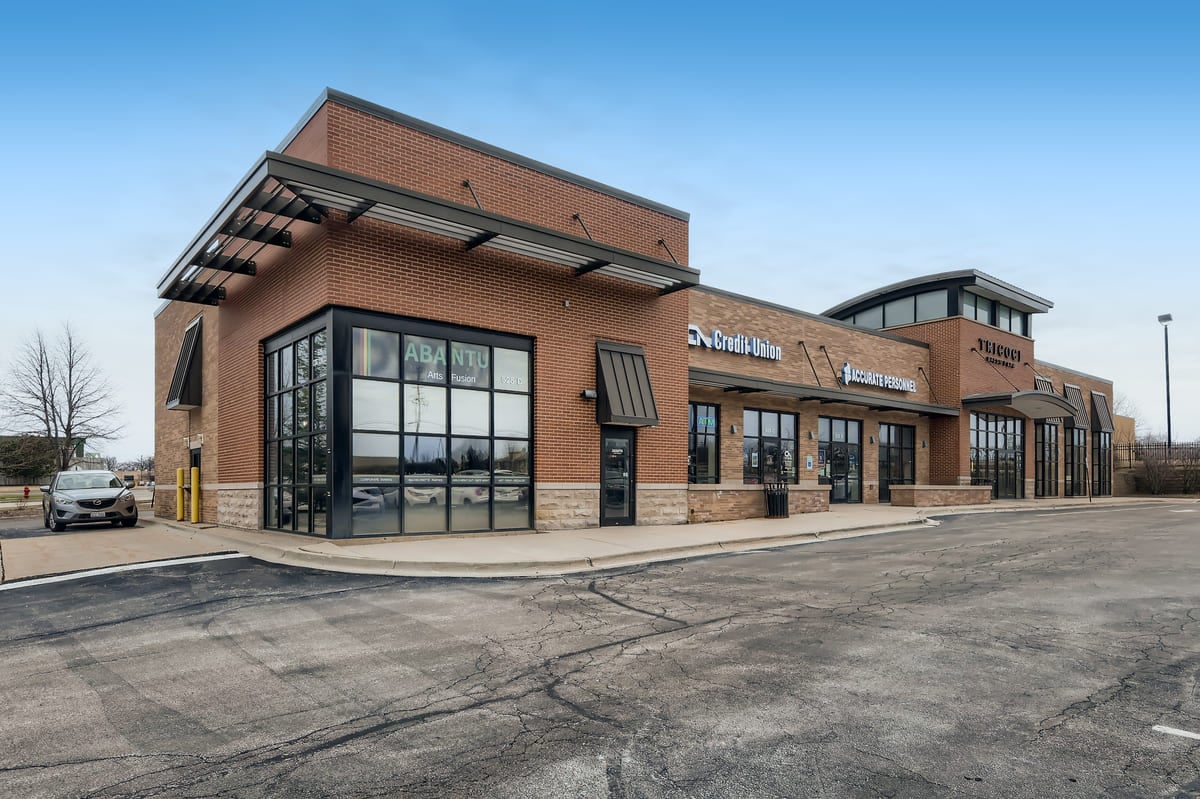
Commercial real estate investing in Chicago can be a powerful vehicle for investors seeking high-end deals. From the city’s downtown office towers to industrial spaces in Arlington Heights and retail centers in Schaumburg, the Chicago commercial real estate market continues to attract investors seeking stable returns and long-term growth.
With more than 50 years serving property owners across the Chicago suburbs, Brian Properties has seen how smart commercial property investment can deliver consistent income, appreciation, and portfolio diversification when managed carefully.
Understanding the balance between potential rewards and inherent risks is essential for any investor looking to grow their portfolio with confidence — let’s discuss below.
What Makes Commercial Real Estate a Rewarding Investment?
Commercial real estate investing offers several unique advantages that set it apart from other asset classes. When done strategically, it can provide steady returns and long-term value.
Property Appreciation Potential in the Chicago Suburbs
Commercial property values in areas such as Naperville, Palatine, and Arlington Heights have shown steady appreciation thanks to consistent demand for retail, industrial, and office space. As population and business activity expand beyond downtown Chicago, suburban markets offer room for growth.
Appreciation also compounds with proper maintenance, tenant retention, and professional management, which all help protect and enhance a CRE investor’s bottom line.
Reliable Rental Income and Cash Flow
Unlike single-tenant residential properties, commercial buildings often have multiple tenants generating separate income streams. This structure creates steady rental cash flow and reduces the risk associated with a single vacancy.
Tax Advantages and Portfolio Diversification
Commercial property owners benefit from tax incentives such as depreciation, 1031 exchanges, and interest deductions. These tools allow investors to reinvest profits, defer taxes, and increase long-term equity.
Beyond tax savings, commercial real estate helps diversify an investment portfolio. Because CRE performance often moves differently from stocks or bonds, it can act as a hedge against inflation and market volatility.
What Are the Biggest CRE Risks to Consider?
Every investment involves some level of risk, and commercial property investment in Chicago is no exception. Understanding these potential challenges helps investors plan smarter and make decisions that support long-term success.
Market Cycles and Vacancy Risks
The Chicago commercial real estate market moves through natural cycles of expansion and contraction. During downturns, higher vacancy rates, or declining demand in certain property types (like downtown office spaces) can reduce income and slow appreciation.
Local market insight and strong leasing strategies can help investors manage these cycles effectively.
Rising Interest Rates and Financing Exposure
Because commercial real estate typically involves larger loans, changes in interest rates can significantly impact cash flow and refinancing options. Rising rates may reduce the value of leveraged assets or make it harder to secure favorable terms.
Partnering with experienced brokers and financial advisors ensures your investment structure aligns with both current and long-term goals.
Maintenance, Management, and Operational Costs
Commercial buildings require consistent maintenance and active management to perform well. Operating costs, like HVAC systems and common area maintenance (CAM), can add up quickly if not carefully controlled.
Professional property management can minimize unexpected expenses and protect the property’s value. Brian Properties’ experienced team helps clients navigate everything from preventive maintenance to vendor negotiations to ensure strong financial performance.
Evaluating Commercial Real Estate Opportunities in the Chicago Market
Before making any investment, it’s important to analyze the local market. Chicago’s diverse economy and extensive transportation network make it an appealing environment for commercial real estate, but each submarket has its own strengths.
Property Location and Accessibility
Properties located near major transportation corridors, such as I-90, I-294, and Route 53, offer strong logistical advantages. Proximity to O’Hare International Airport also makes surrounding industrial and office properties especially attractive to national and global companies.
When evaluating a potential acquisition, consider how location factors like visibility, parking, and accessibility align with tenant needs.
Property Type Performance
Different commercial property types perform uniquely within the Chicago market:
- Industrial properties in the Northwest suburbs continue to see high demand and low vacancy rates.
- Retail centers perform best in established suburban corridors with consistent consumer traffic.
- Office spaces are adapting to flexible workspace trends, creating both risk and opportunity for repositioned assets.
- Multifamily developments remain strong due to limited housing inventory and rising rental demand.
Each asset class carries its own risk profile, so aligning property type with your tolerance and investment timeline is key.
How Brian Properties Helps CRE Investors Maximize Returns
Commercial real estate investing requires experience, resources, and strong local knowledge. Brian Properties offers all three, helping investors across the Chicago metropolitan area build value through strategic acquisition, leasing, and management.
Data-Driven Insights and Local Expertise
Our team combines five decades of historical market data with up-to-date trend analysis. This helps investors identify emerging opportunities before the competition and make informed decisions about where and when to invest.
Whether it’s an industrial park in Schaumburg or a retail center in Arlington Heights, our understanding of local tenant demand helps clients reduce risk and maximize ROI.
Lease Negotiation, Management, and Cost Control
Every dollar saved in operations contributes directly to profitability. Brian Properties’ scale allows access to preferred vendor pricing and efficient maintenance solutions. Our skilled leasing team negotiates favorable terms that protect owner interests while maintaining tenant satisfaction.
We also provide full-service property management that includes:
- Preventive maintenance planning
- CAM reconciliation and expense tracking
- Tenant relations and retention strategies
- Financial reporting and budgeting
These services ensure every property in your portfolio performs at its best year after year.
Learn How to Invest in Chicago Commercial Real Estate with Brian Properties
Balancing risk and reward is part of every commercial real estate investing strategy. With the right team, investors can navigate market cycles, protect their capital, and uncover opportunities for growth throughout Chicago’s thriving suburban markets.
Brian Properties has been helping investors achieve those results for over 50 years. From strategic brokerage services to comprehensive property management, our team is here to guide you every step of the way.
Contact us today to discuss your goals and discover how Brian Properties can help you build a stronger, more resilient investment portfolio in Chicago’s commercial real estate market.
Frequently Asked Questions About Commercial Real Estate Investing in Chicago
What are the risks of investing in commercial real estate in Chicago?
Commercial property investments carry risks related to market cycles, vacancy rates, and financing conditions. Periods of economic slowdown can reduce tenant demand or impact rental income, especially in office and retail sectors. Working with an experienced commercial management team like Brian Properties helps mitigate these challenges through strategic leasing, preventive maintenance, and market analysis.
Is commercial property a good investment in the Chicago suburbs?
Yes. Suburban areas like Arlington Heights, Schaumburg, and Naperville continue to offer strong opportunities for investors. These submarkets benefit from business relocation trends, population growth, and accessible transportation corridors. Many investors find suburban assets more stable and easier to manage compared to downtown properties.
How can professional property management improve commercial investment returns?
Professional property management plays a key role in maximizing returns. It ensures consistent maintenance, timely rent collection, and proactive tenant retention. At Brian Properties, our team helps reduce operating costs, manage CAM expenses, and negotiate favorable leases, all of which enhance cash flow and long-term property value.
Similar Posts
Jan
Chicago Commercial Real Estate Investing 101
Are you interested in unlocking the power of commercial real estate (CRE) as an investment but need help knowing where to begin?
There's a lot to...
Feb
Why Consider New Suburban Commercial Real Estate Construction
Chicago's status as one of the nation's leading commercial centers, location as a key transportation hub, and growing demand for retail space make it...
Feb
Tips and Tricks for Investing in the Chicago Commercial Real Estate Market
While the commercial real estate market is a different game than residential, subject to various market forces, legal obligations, and financing...



